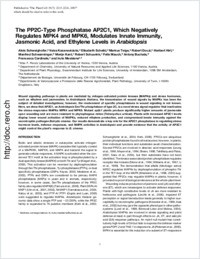The PP2C-type phosphatase AP2C1, which negatively regulates MPK4 and MPK6, modulates innate immunity, jasmonic acid, and ethylene levels in Arabidopsis
- Schweighofer, Alois Max F. Perutz Laboratories of the University of Vienna, Austria
- Kazanaviciute, Vaiva Max F. Perutz Laboratories of the University of Vienna, Austria
- Scheikl, Elisabeth Max F. Perutz Laboratories of the University of Vienna, Austria
- Teige, Markus Max F. Perutz Laboratories of the University of Vienna, Austria
- Doczi, Robert Max F. Perutz Laboratories of the University of Vienna, Austria
- Hirt, Heribert Max F. Perutz Laboratories of the University of Vienna, Austria
- Schwanninger, Manfred Department of Chemistry, University of Natural Resources and Applied Life Sciences, Vienna, Austria
- Kant, Merijn Department of Plant Physiology, Swammerdam Institute for Life Sciences, University of Amsterdam, The Netherlands
- Schuurink, Robert Department of Plant Physiology, Swammerdam Institute for Life Sciences, University of Amsterdam, The Netherlands
- Mauch, Felix Département de Biologie, Université de Fribourg, Switzerland
- Buchala, Antony J. Département de Biologie, Université de Fribourg, Switzerland
- Cardinale, Francesca Dipartimento di Valorizzazione e Protezione delle Risorse Agroforestali, Plant Pathology, University of Turin, Italy -
- Meskiene, Irute Max F. Perutz Laboratories of the University of Vienna, Austria
-
13.07.2007
Published in:
- The Plant Cell. - 2007, vol. 19, no. 7, p. 2213-2224
English
Wound signaling pathways in plants are mediated by mitogen-activated protein kinases (MAPKs) and stress hormones, such as ethylene and jasmonates. In Arabidopsis thaliana, the transmission of wound signals by MAPKs has been the subject of detailed investigations; however, the involvement of specific phosphatases in wound signaling is not known. Here, we show that AP2C1, an Arabidopsis Ser/Thr phosphatase of type 2C, is a novel stress signal regulator that inactivates the stress-responsive MAPKs MPK4 and MPK6. Mutant ap2c1 plants produce significantly higher amounts of jasmonate upon wounding and are more resistant to phytophagous mites (Tetranychus urticae). Plants with increased AP2C1 levels display lower wound activation of MAPKs, reduced ethylene production, and compromised innate immunity against the necrotrophic pathogen Botrytis cinerea. Our results demonstrate a key role for the AP2C1 phosphatase in regulating stress hormone levels, defense responses, and MAPK activities in Arabidopsis and provide evidence that the activity of AP2C1 might control the plant's response to B. cinerea.
- Faculty
- Faculté des sciences et de médecine
- Department
- Département de Biologie
- Language
-
- English
- Classification
- Biological sciences
- License
-
License undefined
- Identifiers
-
- RERO DOC 8650
- DOI 10.1105/tpc.106.049585
- Persistent URL
- https://folia.unifr.ch/unifr/documents/300439
Statistics
Document views: 185
File downloads:
- pdf: 288
